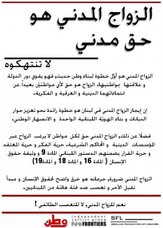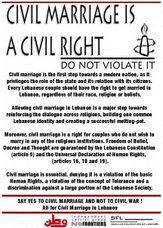
لا يوجد في لبنان حتى اليوم قانون موّحد للأحوال الشخصيّة. فكلّ طائفة تتبع قوانينها الخاصة المستمدّة من الشريعة للمسلمين ومن الكنيسة للمسيحيّن. وبما أن في لبنان اليوم 18 طائفة فهناك 18 محكمة روحيّة لها قوانينها الخاصة وقضاتها وطرق تنفيذ أحكامها. لذا تمّ إقتراح قانون الزواج المدني الذي يوّحد جميع اللبنانيين في حقوقهم وواجباتهم. فما هو تاريخ الزواج المدني في لبنان، ما هي شروطه، ما هو موقف الطوائف من هذا الزواج، وأخيرًا ماهي الحلول التي يقدمها؟
تاريخ الزواج المدني
مشروع الزواج المدني في لبنان ليس حديثًا فهو يعود الى سنة 1951 حيث نوقش في البرلمان ثم رفض، وفي سنة 1960 بدأت جمعيّات علمانيّة تطالب به من جديد عبر التظاهر. وعاد ليطرح في البرلمان من جديد سنة 1975 من قبل الحزب الديموقراطي.ولكنه أثار جدلًا كبيرًا عندما طرحه الرئيس الياس الهراوي (وهو الرئيس الوحيد الذي طرحه) وأخذ اصداء كبيرة بين موال ومعارض. وقد جاء مشروع الزواج المدني الأخير في لبنان واحدًا من مشاريع عدة تطال الخطوبة والزواج والإرث وحضانة الأطفال والطلاق والنفقة. ولكن هذا المشروع لم يصل حتى للبرلمان اللبناني.
مشروع معدّل
إن اهم تعديل طال مشروع الزواج المدني في لبنان هو جعله إختياريّا وليس إلزاميّا كما في الخارج. وذلك إرضاءً لرجال الدين لأسباب عدة. وبما أن غالبية المعارضين للزواج المدني في لبنان يرون فيه دمارًا للعائلة لأنه يسهّل الطلاق فقد جاء في بنود قانون الزواج المدني الذي هو عقد بين طرفين لإنشاء عائلة ما يأتي
عدم إقتران أحد الطرفين بزواج سابق ويجب الإبلاغ عن الرغبة في الزواج قبل 15 يومًا من إبرام عقد الزواج المدني
يجب على الأزواج الإنتظار ثلاثة سنين قبل أن يقدموا طلبًا للطلاق
يقبل الطلاق في حال الخيانة. ويلغى الزواج في حال الخطأ في الشخص والغش والإكراه
ولكن بصورة عامة إن شروط الطلاق أو إلغاء الزواج قاسيّة في هذا المشروع وليس مسموحًا الإعتقاد أن الزواج المدني هو عقد قصير المدة وأن بالإمكان فكّه بسهولة
موقف الطوائف
قوبل مشروع الزواج المدني الإختياري في لبنان برفض كبير من المسلمين ثم من المسيحين حتى كان إختياريًّا. لكل من هذه الطوائف أسبابها الخاصة.
بالنسبة للكنيسة فهي رفضت الزواج المدني لسببين. أولًا إن الزواج في الكنيسة ليس عقدًا بشروط دنيويّة بل هو سرّ من اسرارها.بمعنى أنه يجب أن يتم بمباركة من رجل الدين المسيحي الذي يمثّل المسيح على الأرض. وثانيًا إن الزواج في الدين المسيحي هو رابط أبديّ "ما جمعه الرب لا يفرّقه إنسان" . لذا لا يوجد طلاق في الكنيسة الكاثوليكيّة إنما إبطال زواج لأسباب ليست بكثيرة(الخيانة وإن كان شروط اثباتها صعبة والغش والأمراض النفسيّة). ولكن الكنيسة تعترف بالزواج المدني لغير المسيحيين.
أما عن رجال الدين المسلمين فقد رفضوا الزواج المدني رفضًا قاطعًا لثلاثة أسباب: أولًا عقد الزواج في الديانة المسلمة يجب أن يخضع لقانون القرآن. ثانيا إن تعددّ الزوحات لا يتعارض مع الإسلام وثالثًا فإن الطلاق مسموح في الدين المسلم وفق شروط القرآن.
المشاكل يحلّها الزواج المدني
إن الزواج المدني قدم حلولًا لمشاكل عدة في لبنان أهمها:
مشاكل ذات طابع عقائدي: إن المسلمة مثلًا، لا تستطيع الزواج من مسيحي لأن الشريعة لا تسمح بذلك. بينما يستطيع الرجل المسلم الزواج من مسيحيّة.
مشاكل الإرث: إن كان الزوجين من طائفتين مختلفتين وبحال موت أحد الطرفين لا يستطيع الآخر أن يرثه.
الإحتيال على القانون: إن عددًا كبيرًا من اللبنانين يعمدون إلى تغيير دينهم أو طائفتهم للتخلص من زواجهم لأن دينهم يلزمهم بقانون لا يؤمنون به.
التطاول على القضاء اللبناني: عندما يقوم اللبنانيون بالزواج المدني في الخارج يجبر القاضي اللبناني بإخضاعهم إلى قانون الدولة التي تزوجوا وفق قوانينها. هذا ما يعتبر تطاولًا على إستقلاليّة القضاء اللبناني.
يجب على الأزواج الإنتظار ثلاثة سنين قبل أن يقدموا طلبًا للطلاق
يقبل الطلاق في حال الخيانة. ويلغى الزواج في حال الخطأ في الشخص والغش والإكراه
ولكن بصورة عامة إن شروط الطلاق أو إلغاء الزواج قاسيّة في هذا المشروع وليس مسموحًا الإعتقاد أن الزواج المدني هو عقد قصير المدة وأن بالإمكان فكّه بسهولة
موقف الطوائف
قوبل مشروع الزواج المدني الإختياري في لبنان برفض كبير من المسلمين ثم من المسيحين حتى كان إختياريًّا. لكل من هذه الطوائف أسبابها الخاصة.
بالنسبة للكنيسة فهي رفضت الزواج المدني لسببين. أولًا إن الزواج في الكنيسة ليس عقدًا بشروط دنيويّة بل هو سرّ من اسرارها.بمعنى أنه يجب أن يتم بمباركة من رجل الدين المسيحي الذي يمثّل المسيح على الأرض. وثانيًا إن الزواج في الدين المسيحي هو رابط أبديّ "ما جمعه الرب لا يفرّقه إنسان" . لذا لا يوجد طلاق في الكنيسة الكاثوليكيّة إنما إبطال زواج لأسباب ليست بكثيرة(الخيانة وإن كان شروط اثباتها صعبة والغش والأمراض النفسيّة). ولكن الكنيسة تعترف بالزواج المدني لغير المسيحيين.
أما عن رجال الدين المسلمين فقد رفضوا الزواج المدني رفضًا قاطعًا لثلاثة أسباب: أولًا عقد الزواج في الديانة المسلمة يجب أن يخضع لقانون القرآن. ثانيا إن تعددّ الزوحات لا يتعارض مع الإسلام وثالثًا فإن الطلاق مسموح في الدين المسلم وفق شروط القرآن.
المشاكل يحلّها الزواج المدني
إن الزواج المدني قدم حلولًا لمشاكل عدة في لبنان أهمها:
مشاكل ذات طابع عقائدي: إن المسلمة مثلًا، لا تستطيع الزواج من مسيحي لأن الشريعة لا تسمح بذلك. بينما يستطيع الرجل المسلم الزواج من مسيحيّة.
مشاكل الإرث: إن كان الزوجين من طائفتين مختلفتين وبحال موت أحد الطرفين لا يستطيع الآخر أن يرثه.
الإحتيال على القانون: إن عددًا كبيرًا من اللبنانين يعمدون إلى تغيير دينهم أو طائفتهم للتخلص من زواجهم لأن دينهم يلزمهم بقانون لا يؤمنون به.
التطاول على القضاء اللبناني: عندما يقوم اللبنانيون بالزواج المدني في الخارج يجبر القاضي اللبناني بإخضاعهم إلى قانون الدولة التي تزوجوا وفق قوانينها. هذا ما يعتبر تطاولًا على إستقلاليّة القضاء اللبناني.
إن البند التاسع من القانون اللبناني يقول بحريّة الإعتقاد والزواج المدني الإختياري يندرج تحت هذه الحريّة. إن جميع القوانين الدينيّة تبني حاجزًا في وجه الزواج من طائفة أخرى. لذا يسافر كثيرون من اللبنانيين إلى الخارج ليتزوجوا مدنيًا. لذا يبدو الزواج المدني حلًا يوّحد اللبنانين ويساويهم بالقانون. كما انه يضمن حق المرأة وينقذها من التمييز الواقع بحقها. لذا يجوز لنا التساؤل لماذا رفض مشروع الزواج المدني من قبل رجال الدين؟








